![]()
Thank you for reading this post, don't forget to subscribe!
Uncover the secrets of optimizing your website with a comprehensive SEO site audit using this easy-to-follow step-by-step guide.

Image courtesy of via DALL-E 3
Table of Contents
- Introduction to SEO Site Audits
- Getting Ready for Your SEO Audit
- Beginning Your Audit
- Checking Site Accessibility
- Analyzing On-Page SEO
- Step 4: Evaluating Off-Page SEO
- Understanding Technical SEO
- Performing Content Analysis
- Assessing User Experience (UX)
- Analyzing Website Security
- Post-Audit Actions
- Conclusion: The Importance of Regular SEO Audits
Introduction to SEO Site Audits
When we talk about improving a website’s visibility on search engines like Google, we often mention something called an SEO site audit. But what exactly is an SEO site audit, and why is it so important for website owners and managers?
What is an SEO Site Audit?
An SEO site audit is like giving your website a check-up or a health check to see how well it’s performing in the eyes of search engines. It involves looking at different aspects of your website to make sure it’s friendly and easily understandable for search engines like Google or Bing.
Why Do We Need an SEO Audit?
Think of an SEO audit as a way to find out what’s working well on your website and what needs improvement. By conducting an SEO site audit, you can identify areas where your website can be optimized to rank higher in search engine results. This means more people will be able to find your website when they search for related topics or products.
Getting Ready for Your SEO Audit
Before we dive into the nitty-gritty details of conducting an SEO site audit, it’s essential to get prepared with the right tools and understand the role of an SEO strategist. By doing so, we can ensure a smooth and efficient audit process that will help improve the performance of our website.
Choosing the Right SEO Tools
When getting ready for your SEO audit, it’s crucial to have the right tools at your disposal to analyze and optimize your website effectively. Some popular SEO tools like SEMrush, Ahrefs, and Google Analytics can provide valuable insights into your site’s performance, keyword rankings, backlinks, and more. These tools can help you identify areas for improvement and track your progress over time.
Role of an SEO Strategist
Understanding the role of an SEO strategist is key to maximizing the impact of your SEO audit. An SEO strategist is responsible for developing and implementing strategies to improve a website’s visibility and ranking on search engine results pages. They analyze data, conduct keyword research, optimize content, and monitor performance to ensure that the website is reaching its target audience effectively. By working with an experienced SEO strategist, you can achieve sustainable growth and success for your website.
Beginning Your Audit
When you start your SEO site audit, it’s important to have a clear plan in place. One way to stay organized is by creating an audit checklist. This checklist will outline the major areas you need to check to ensure that your website is optimized for search engines like Google. Some key items to include on your checklist are:
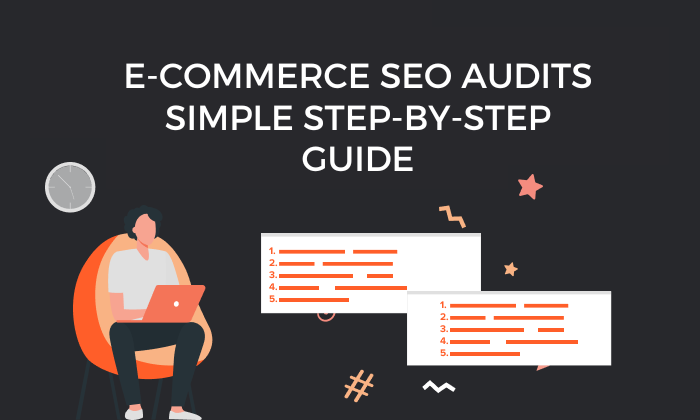
Image courtesy of via Google Images
– Checking for broken links on your site
– Reviewing your website’s meta tags and descriptions
– Analyzing your website’s site architecture
– Evaluating your website’s mobile-friendliness
Setting Audit Goals
Before diving into your audit, it’s essential to define what you want to achieve. Setting clear audit goals will help you stay focused and ensure that you address specific issues that may be affecting your website’s SEO performance. Some common goals for an SEO audit include:
– Improving website visibility in search engine results
– Increasing organic traffic to your site
– Enhancing the user experience on your website
– Fixing technical issues that may be hindering your SEO efforts
By setting clear audit goals, you’ll be better equipped to address any issues and make meaningful improvements to your website’s SEO performance. So, take the time to establish your goals before you begin your audit!
Checking Site Accessibility
Now that we’ve begun our SEO audit, it’s crucial to ensure that your website loads quickly. Why does this matter? Well, think about it this way – when you search for something on the internet, you want the results to show up fast, right? The same goes for your website. If it takes too long to load, people might get frustrated and leave before even seeing your amazing content. And guess what? Search engines like Google pay attention to how fast your site loads too. They want to make sure they’re sending people to websites that work well and load quickly.
Crawlability
Another important factor to consider when checking site accessibility is crawlability. What does that mean? Basically, you want search engines like Google to be able to read and understand what’s on your website. They use little bots called crawlers to go through all the information on your site. So, if your website is easy to crawl, these bots can quickly find all your awesome content and show it to people searching for similar topics. If your site isn’t set up properly for crawling, search engines might miss some of your content, and that’s not good for your SEO!
Analyzing On-Page SEO
When we talk about on-page SEO, we mean looking at individual pages on your website and making sure they are optimized for search engines like Google. One important aspect of on-page SEO is the use of title tags and meta descriptions. Title tags are like the headlines of your web pages, and they tell search engines and users what the page is about. Meta descriptions are short summaries that appear below the title in search results, giving users a preview of what they can expect on the page.
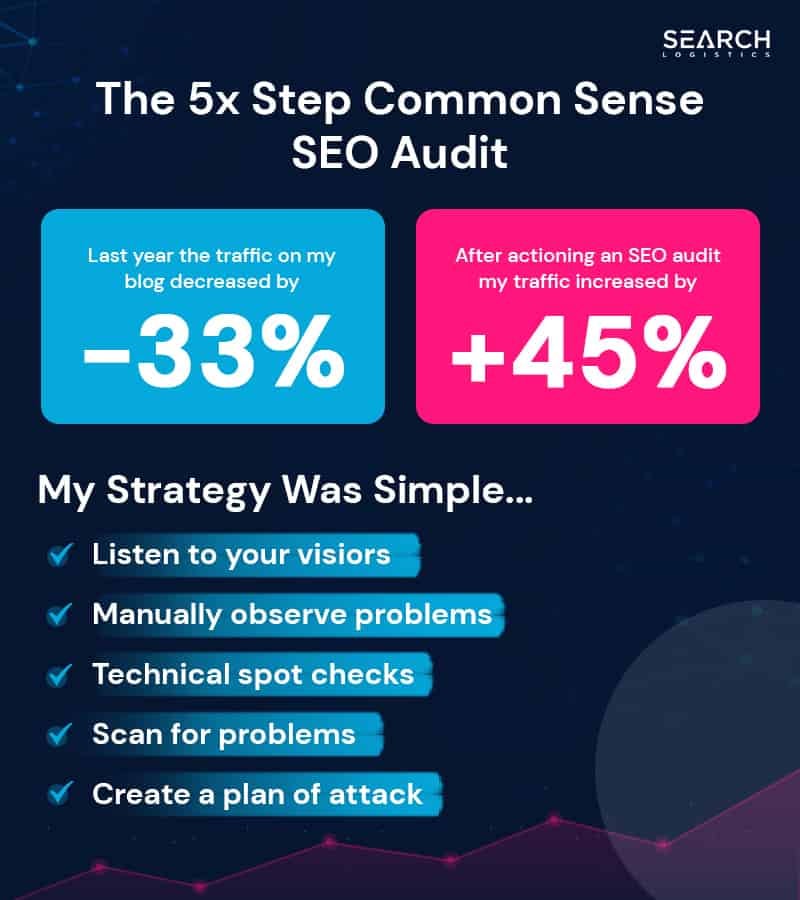
Image courtesy of via Google Images
Content Quality
Another crucial element of on-page SEO is the quality of your content. Search engines love websites that provide valuable and relevant information to users. This means you need to have content that is well-written, informative, and engaging. Make sure your content answers questions that users might have and solves their problems. High-quality content not only helps you rank better in search results but also keeps visitors on your site longer, which is great for your SEO.
Step 4: Evaluating Off-Page SEO
When it comes to improving a website’s search engine optimization (SEO), it’s not just what’s on the website itself that matters. Off-page factors can also have a significant impact on how well a site ranks in search results. In this section, we’ll explore the importance of evaluating off-page SEO to boost your website’s visibility and credibility.
Backlinks
One of the key components of off-page SEO is the quality and quantity of backlinks pointing to your website. Backlinks are links coming from other websites to yours, and search engines like Google see them as a vote of confidence in your site’s content and authority. The more high-quality backlinks you have, the more trustworthy and relevant your website appears to search engines.
It’s essential to assess the backlink profile of your site during an SEO audit to ensure that you’re attracting the right kind of links. Look for backlinks from reputable and relevant websites in your industry. Disavow any toxic or spammy backlinks that could harm your site’s SEO performance.
Social Media Presence
In today’s digital landscape, social media plays a crucial role in off-page SEO. While social media signals themselves are not direct ranking factors, a strong social media presence can indirectly impact your website’s SEO performance. When your content gets shared, liked, and commented on social media platforms, it can drive more traffic to your site, increase brand visibility, and attract potential backlinks.
During your SEO audit, evaluate your social media strategy and presence. Are you active on the right platforms where your target audience spends time? Is your content shareable and engaging? Consider ways to optimize your social media presence to amplify your off-page SEO efforts and boost your website’s authority in the eyes of search engines.
Understanding Technical SEO
When it comes to optimizing your website for search engines, technical SEO plays a crucial role in determining how well your site ranks in search results. Let’s dive into the technical aspects that can either enhance or hinder your website’s SEO performance.
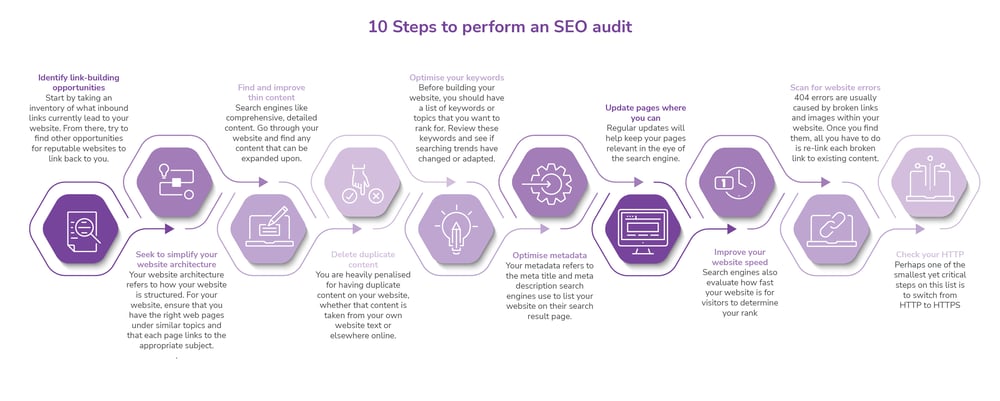
Image courtesy of via Google Images
Mobile-Friendliness
One important aspect of technical SEO is ensuring that your website is mobile-friendly. In today’s digital age, many users access websites on their smartphones and tablets. Google gives preference to mobile-friendly websites in its search results, so it’s essential that your site functions well on various devices.
Site Architecture
Another key element of technical SEO is the site’s architecture. This refers to how the pages on your website are structured and linked to each other. An organized and easy-to-navigate site architecture not only helps users find what they’re looking for but also makes it easier for search engine crawlers to index your content.
Performing Content Analysis
When it comes to ensuring your website is optimized for search engines, analyzing the content is a critical step. By performing content analysis, you can determine whether your site is effectively delivering the information users are searching for. Let’s dive into the key aspects of content analysis that will help improve your website’s visibility.
Keyword Usage
Keywords are the words or phrases that people type into search engines to find relevant content. As part of content analysis, it’s crucial to ensure that your website uses the right keywords strategically. By incorporating relevant keywords naturally into your content, you can increase the chances of your site appearing higher in search engine results.
Make sure to conduct thorough keyword research to identify the terms your target audience is using. By aligning your content with these keywords, you can attract more organic traffic to your website.
Duplicate Content
Having duplicate content on your website can negatively impact your SEO efforts. Search engines prioritize unique and original content, so having the same information repeated across multiple pages can confuse search engine algorithms and result in lower rankings.
During content analysis, be sure to identify and address any instances of duplicate content on your site. By removing or consolidating duplicative content, you can improve the user experience and boost your SEO performance.
By paying close attention to keyword usage and eliminating duplicate content, you can enhance the quality and organization of your website’s content. This, in turn, can lead to improved search engine visibility and increased traffic to your site.
Assessing User Experience (UX)
When we talk about the user experience of a website, one important aspect to consider is how easy it is for people to find what they need. Imagine trying to find your favorite toy in a messy room – it can be frustrating! Similarly, if a website is not well organized and users can’t navigate it easily, they might give up and leave. That’s why making sure that the website is structured logically, with clear menus and links, is crucial for a positive user experience.
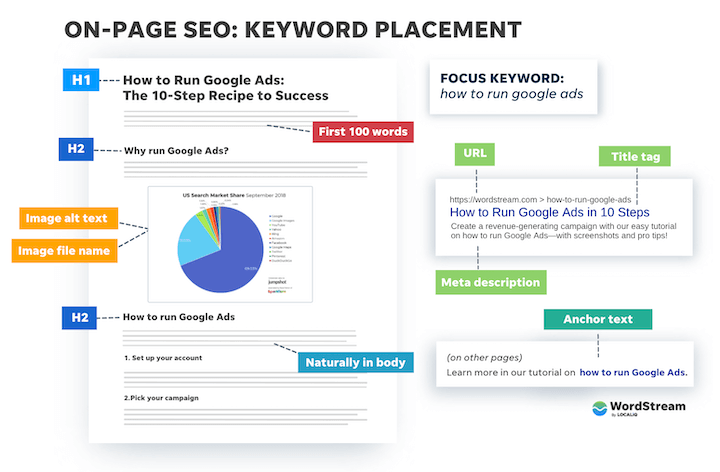
Image courtesy of via Google Images
Visual Appeal
Have you ever visited a website that had bright colors, interesting images, and a clean layout that made it fun to explore? The visual appearance of a website plays a big role in how users perceive it. A visually appealing site can capture users’ attention and make them more likely to stay and explore further. On the other hand, a cluttered or outdated design can make users click away quickly. So, creating a visually appealing website is not just about looking pretty—it can also impact how well your site ranks on search engines.
Analyzing Website Security
When it comes to running a website, security is crucial. Not only does it protect your website and its visitors from potential threats, but it also plays a significant role in your website’s SEO performance. Let’s dive into the importance of keeping your website secure and the key aspects to consider when analyzing website security.
HTTPS Encryption
Have you ever noticed a small lock icon next to a website’s address in your browser? That lock indicates that the website is using HTTPS encryption, which means that the connection between your browser and the website is secure. This is essential for keeping sensitive information, like passwords or credit card details, safe from hackers.
Additionally, Google considers HTTPS encryption as a ranking factor, meaning websites with HTTPS are more likely to appear higher in search results. So, not only does it keep your visitors safe, but it also boosts your website’s SEO performance.
Security Certificates
Security certificates play a vital role in website security. They are digital certificates that verify the authenticity of a website and encrypt the data transmitted between the website and its visitors. When a website has a security certificate, it builds trust with visitors, assuring them that their information is safeguarded.
From an SEO perspective, having a security certificate is essential for achieving a higher ranking on search engines. Google values website security and rewards websites that prioritize protecting their users. By obtaining and maintaining a security certificate, you not only enhance your website’s credibility but also improve its visibility online.
Post-Audit Actions
Now that we have completed the SEO audit, it’s time to look at the findings and create a plan to address any issues that were identified. As an SEO strategist, my role is to analyze the data we collected during the audit and prioritize the areas that need improvement.
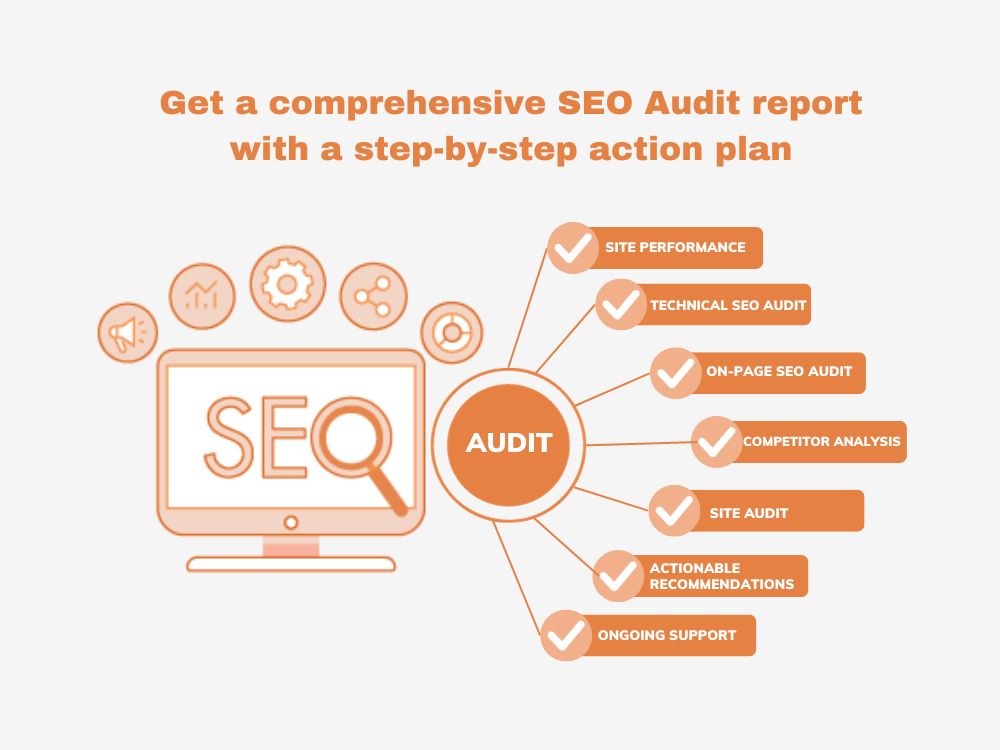
Image courtesy of via Google Images
One of the first steps in making a plan is to categorize the issues based on their impact on the website’s search performance. Issues that have a high impact, such as a slow loading speed or missing title tags, should be addressed first to have the most significant impact on SEO.
It’s essential to set realistic goals and timelines for fixing these issues. We need to be strategic in our approach and focus on the most critical aspects that will yield the best results. By organizing our plan in a systematic way, we can ensure that our efforts are targeted and efficient.
Implementing Changes
After we have devised a plan to address the identified issues, the next step is to start implementing the necessary changes on the website. This may involve updating meta descriptions, optimizing content for keywords, fixing broken links, or improving site speed.
As an SEO strategist, I will work closely with the website owner or web development team to implement these changes effectively. It’s crucial to monitor the progress regularly and make adjustments as needed to ensure that the fixes are having the desired impact on the site’s SEO performance.
By staying proactive and continually optimizing the website based on the audit findings, we can help improve its visibility on search engines and attract more organic traffic. Implementing changes is an ongoing process that requires diligence and attention to detail, but the rewards in terms of improved search rankings and increased website traffic make it well worth the effort.
Conclusion: The Importance of Regular SEO Audits
Regular SEO audits are crucial for ensuring that your website remains visible and competitive in the vast online landscape. By conducting frequent audits, you can identify and address any issues that may be hindering your site’s search engine performance. Here’s why regular SEO audits are essential:
Continuous Improvement
Search engine algorithms are constantly evolving, and what worked for your site yesterday may not be as effective today. Regular audits allow you to stay on top of the latest trends and best practices in SEO, ensuring that your website remains optimized for success.
Preventing Penalties
Search engines like Google have strict guidelines that websites must follow to maintain good rankings. Regular audits help you identify and rectify any violations of these guidelines before they result in penalties that could harm your site’s visibility.
Optimizing User Experience
SEO is not just about pleasing search engines; it’s also about creating a positive experience for your website visitors. Regular audits help you identify and fix issues that could be frustrating or confusing for users, ultimately leading to higher engagement and conversions.
Staying Ahead of the Competition
In the highly competitive online landscape, staying ahead of your competitors is key to success. Regular SEO audits help you identify opportunities for improvement and innovation that can give you an edge over others in your industry.
By prioritizing regular SEO audits and making the necessary adjustments based on their findings, you can ensure that your website remains visible, user-friendly, and competitive in the ever-changing world of online search.
Get Your Free SEO Report Now.
Brought to you by StoreAndHost GET YOUR SEO-REPORT
About us and this blog
We are a digital marketing company with a focus on helping our customers achieve great results across several key areas.
Request a free quote
We offer professional SEO services that help websites increase their organic search score drastically in order to compete for the highest rankings even when it comes to highly competitive keywords.
Subscribe to our newsletter!
More from our blog
See all postsRecent Posts
- Boost Your Pagerank with Proven SEO Tips April 2, 2024
- SEO Cheat Sheet: Top Google Tips April 2, 2024
- Boost Sales with Google SEO Optimization April 2, 2024










